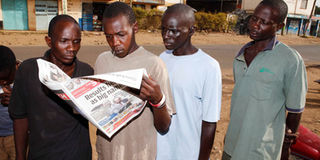Rigging claims mar Kenya presidential vote count

People gather around a newspaper stand in the area of Kangele slums in Kisumu, as Kenyans await results for tightly fought presidential elections, the first since disputed polls five years ago triggered a wave of bloodletting, with deputy prime minister Uhuru Kenyatta taking an initial lead. AFP PHOTO
The vote in Kenya's close election race has been "doctored", presidential hopeful and current runner-up Raila Odinga's camp said Thursday, calling for calm as counting continued.
The rigging claims by Prime Minister Odinga's supporters were immediately dismissed by Kenya's electoral commission, but they added to tensions in a nation still scarred by the deadly violence that erupted after disputed polls five years ago.
"We have evidence that the results we have received have been doctored," Odinga's running mate Kalonzo Musyoka told reporters, adding that in some cases "total votes cast exceeds the actual number of registered voters".
"Because of these concerns, we as a coalition take the position that the national vote tallying process lacks integrity and has to be stopped," Musyoka said.
But he stressed that the accusations were "not a call to mass action" as he pleaded for calm and stressed that the party was "committed to the principle of rule of law".
Three days into the tallying process, with more than half the total votes counted, Odinga has 2.6 million votes compared to his rival Deputy Prime Minister Uhuru Kenyatta's 3.1 million.
Final results could be released on Friday, although the Independent Electoral and Boundaries Commission legally has until Monday to announce the outcome of the closely-fought race, which saw over 70 percent of the country's 14.3 million registered voters cast a ballot.
"There is no room to doctor results whatsoever," Ahmed Issack Hassan, head of the electoral commission, told reporters in response to the Odinga team's vote-rigging claims.
"Any results showing total votes cast exceed the number of registered voters calls for cancellation -- so far we have not seen any such results," he said.
But it's not the first time the slow-moving ballot count has come under fire. Earlier this week, an electronic system designed to count and announce the results failed to work properly, forcing election officials to read out hand-delivered results in person.
Kenyatta's party has also raised concerns over electoral process, complaining about a very high number of spoiled ballots in the vote.
Initial results sent electronically showed that the spoiled ballots made up more than five percent of votes cast -- greatly adding to the number needed for a candidate to break the 50-percent threshold for a first round win, and increasing the prospect of a run off.
The number of spoiled ballots dropped from hundreds of thousands to tens of thousands, however, after the election commission stopped relying on the electronic tallying system.
"All of a sudden, because of this manual delivery of tallies, there is a tremendous reduction in the number of spoilt votes," Musyoka said.
IEBC chief Hassan said the dramatic drop was due to an error in the electronic system that had multiplied by eight the number of rejected votes.
Odinga and Kenyatta -- the son of independent Kenya's founding president -- have both publicly vowed there will be no repeat of the 2007-2008 bloodshed that broke out over the counting process and left more than 1,100 people dead.
Kenya has been largely calm in recent days apart from isolated incidents of violence.
Odinga also ran for president last time and has always insisted he was robbed of victory in 2007, which went to his main rival Mwai Kibaki, who was backed by Kenyatta.
ICC delays Kenyatta's atrocities trial
Accused of orchestrating some of the post-poll unrest, Kenyatta -- one of Africa's richest and most powerful men -- and his running mate William Ruto each face a crimes against humanity trial at the International Criminal Court.
Both face charges including orchestrating murder, forcible transfer and persecution in the aftermath of the 2007 elections.
Kenyatta's trial was due to start next month, which would have clashed with a potential second-round run off. But The Hague-based court on Thursday said it was postponing the proceedings until July 9 because of "serious issues" that may not be resolved by April.
The move came after a key prosecution witness withdrew a statement.
To win outright and avoid a second round, a candidate must win more than half of all votes cast, according to the constitution, as well as at least 25 percent of votes in more than half of all 47 counties.




